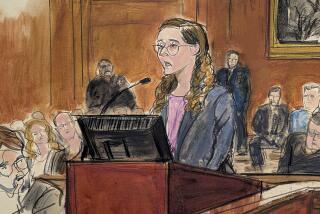Ellison destroyed evidence, judge rules
- Share via
Oracle Corp. Chief Executive Larry Ellison deliberately destroyed or withheld e-mails and failed to preserve tape recordings that should have been turned over to lawyers for shareholders suing him, a judge has ruled.
U.S. District Judge Susan Illston in San Francisco said Tuesday that the e-mails, as well as recordings of interviews for a book about Ellison, were willfully withheld. Ellison and Oracle knew the material was potentially relevant to claims that they made false statements about the company’s 2001 second-quarter financial results and problems with a software product, Illston said.
As a penalty, Illston said the jury would be instructed to assume that Ellison knew about the problems. The judge also said she would take that assumption into account when deciding whether to rule in favor on investors’ claims and Oracle’s requests to dismiss the case. Trial is scheduled to begin March 30.
Spokesmen for Oracle and the shareholders didn’t return calls seeking comment.
In the shareholder lawsuit, Ellison turned over 15 e-mails and an additional 1,650 of his e-mails from the files of other Oracle employees were turned over, according to Illston’s ruling. Ellison and Oracle had a duty to preserve his e-mails after the suit was filed in March 2001. Many missing e-mails were from after that date, Illston said.
The shareholders also sought 135 hours of recorded interviews from March 2001 to August 2002 with Ellison for the book “Softwar: An Intimate Portrait of Larry Ellison and Oracle” by Matthew Symonds. Symonds destroyed the recordings by directing a computer repair shop to dispose of the laptop on which the recordings were stored.
Illston said Ellison turned over 200 pages of transcripts from 2002 and none from 2001.
The tools for discovering e-mail destruction have become more sophisticated in recent years, said Michael Overly, a partner in law firm Foley & Lardner and author of the book “Overly on Electronic Evidence.”
“The likelihood of getting caught is now extremely high,” Overly said.
When someone intentionally destroys relevant evidence in a lawsuit, the judge may instruct jurors to assume that the evidence is unfavorable to the side that destroyed it, as in the Oracle case, Overly said. Judges may also decide the entire lawsuit against the evidence destroyer or impose a monetary fine.
Illston said the destroyed or withheld information wouldn’t help shareholders demonstrate that all their claims should be tried in court. The judge denied investors’ request for sanctions against Oracle and Ellison for allegedly withholding other evidence and for a pretrial ruling that investors lost money because the company concealed information.
Investors claim that Redwood City, Calif.-based Oracle improperly booked millions in sales in 2001. Ellison knew about the problems and sold $900 million of company stock before they were disclosed publicly, investors said.
Ellison settled a similar investor lawsuit in 2005.
More to Read
Inside the business of entertainment
The Wide Shot brings you news, analysis and insights on everything from streaming wars to production — and what it all means for the future.
You may occasionally receive promotional content from the Los Angeles Times.










